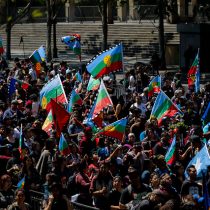
Those days of the social outburst the phrase “Chile awoke” became popular. These words describe very well what has happened, on the understanding that this awakening was not of a restful sleep, but rather of the nightmare of a long period of punishment, abuse and discrimination of the vast majority of the citizens of this country. Many people came out of an extensive lethargy of indifference and resignation, to say that they will no longer tolerate the status of excluded.
This attitude, of a majority that chose to abandon the slavery of silence, has also had the effect, the terror of that caste that has established the rules of the game of democratic institutionality that has governed us so far. However, this small group that has administered power at will has gone from the initial bewilderment and panic of losing everything, to the cold gaze of events to look for strategies that allow it to remain in the position of privilege they have enjoyed.
This caste, in which the full range of the political system participates, including a group of young people who generated the expectation of change, seem to have as their header an old text, written 507 years ago. Indeed, Machiavelli, in “The Prince,” recommends to the rulers how to attain, maintain, and manage power and states, “Those who, with the help of fortune, become princes little effort need to become so, but must make many efforts to support the thee, adding, “He who has least relied on chance is always the one who has longest been preserved in his conquest.”
And the path was set out from the “Agreement for Social Peace and the New Constitution”, signed by the parties, in reaction to a scenario they knew how to control. I do not want to attribute bad intentions to that agreement, I am just saying that its implementation has revealed the effort of that caste to maintain the order that has given them good and abundant fruits.
To these “leaders” of a deeply corrupted system, I remind you of a phrase from your “sacred book,” when Machiavelli warned: “It is deceived who believes that new rewards make great human beings forget the old injustices that have been victimized.”
Since it’s not good to defame people, let’s look at the facts, which speak for themselves. We have all witnessed the expansion of the issue of seats reserved for indigenous peoples, in the context of the design of the Constitutional Convention. In this process, which has been analyzed in depth by the parties, with regard to the advantages and disadvantages that bring them, they left out indigenous peoples, the independents and the social leaders, who are precisely the groups that are now in complete inequality with regard to the spaces of real participation.
So, instead of the result of social mobilizations being the deepening of democracy, the exact opposite seems to be happening. Those who promoted change, which was the mobilized people and not the parties, have been left out of this space of new democratic dialogue of which they are their legitimate authors.
And this situation seems contradictory, because it is precisely through political dialogue that citizens should be enabled to participate in decision-making, to accentuate democracy and avoid conflict, whether these economic, social or indigenous politicians. This is the relevance of establishing legitimate and legal procedures to ensure the expression and development of capacities and opportunities for Chilean citizens as well as indigenous citizens.
The deepening of democracy entails the construction of a comprehensive citizenship, which recognizes popular sovereignty as the legitimate source of power and establishes the existence and proper functioning of the State. Our people’s sovereignty ends immediately after voting, as this seems to be the only right to which we have free and equal access.
How is it possible, then, that we mobilize so much and so many, and change nothing? One of the reasons is because the political system is taking us to the territory that dominates, Congress, a custom Constitutional Convention, instrumental agreements and all the spaces it still controls.
Meanwhile, society has become impoverished and there are an increasing number of people who hopefully have to eat. It’s becoming clearer that it’s not there is a collective partnership project and rather an individual model continues to be imposed in which everyone looks after their own interests. As Francis says in Fratelli Tutti “Save who can” will quickly translate into the “all against all”, and that will be worse than a pandemic.”
This form of society collides strongly with our vision of kume mongen (good living), which was adopted by the Mapuche people thousands of years ago, where the maxim is “I am, because we are”.
As for the quotas reserved for indigenous people, we simply cannot remain the commodity of the owners of political power, parties and Congress. This discussion has been held on electoral calculations of convenience, where indigenous people are much more of a erbo than a contribution to the rich diversity of this country. We are immersed in an island of political, social and citizen segregation, on which we cannot decide our future. In short, this is not a demographic problem, it is a problem of how political power is managed, with a notoriously racist accent.
Therefore, statements regarding indigenous reserved quotas must be demystified. There are some fundamentalists, disguised as a “tank of thought”, such as the case of Freedom and Development, who has said, shamefully, that reserved quotas affect the freedom of voting. There is no doubt that in democracy they choose the majority, but how is the opinion of minorities welcomed? Beyond this constitutional process, there must be an open indigenous standard for indigenous people to choose among their peers. A State that assumes its multinational character recognizes the ability of peoples to define their own destiny.
Another demure argument against the quotas of native peoples relates to an alleged defence of the rights of other minorities. In this regard, I declare my respect for all minorities and their right to exist and express themselves, but indigenous peoples cannot be compared with many minorities who are ultimately the consequence of the society that has created the State. In the case of indigenous peoples, it should be remembered that we inhabited this territory long before the State was formed, so we are in the field of natural rights.
On the other hand, the original peoples are nations, with language, with an identity culture, with an ancient history to defend, and with a common future. Not a poor and violent indigenous population like trying to introduce us.
After all, the problem is not democracy, nor parties, they are the ones who have appropriated power using their parties and who have administered a democracy as a tailored suit. We need decent politicians, good people, leaders and leaders in the character of statesmen, rulers who are steeped in the reality of normal citizens. And we must put in the priorities of the whole society, the pains that the people have put on the public agenda.
To those who have not understood, we must clarify that we are neither right nor left, we are the ones below fighting for the dignity that belongs to us. We are against all those who have broken the social pact, to build their privileges at the expense of the sacrifice of the great social majority.
This caste has not only made laws that accommodate it, but have violated with impunity the laws that must ensure the common good. That’s why those on the periphery and the excluded have lost their respect. The challenge of maintaining governance necessarily comes from recomposing trust with the actors of democracy. This requires building a socially and politically legitimized agenda, which means seeing progress towards a new conception of development.
That is the task of the moment: to walk towards a more inclusive and lasting human development, which is what we have called, good living.
The content poured into this opinion column is the sole responsibility of its author, and does not necessarily reflect the editorial line or position of El Mostrador.





